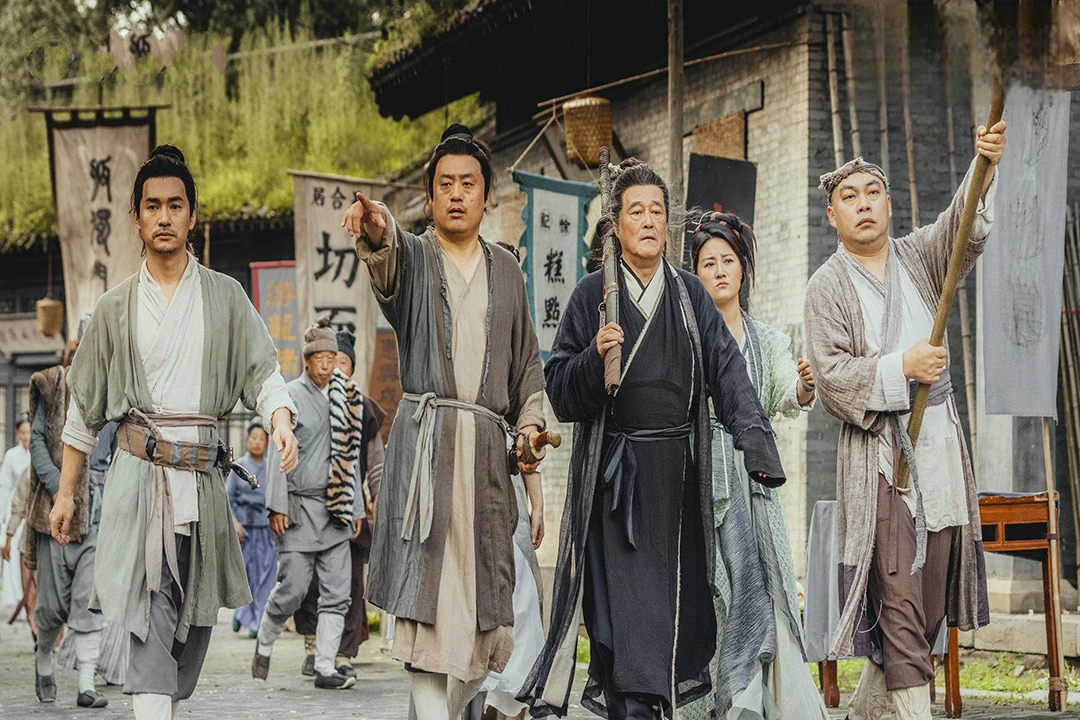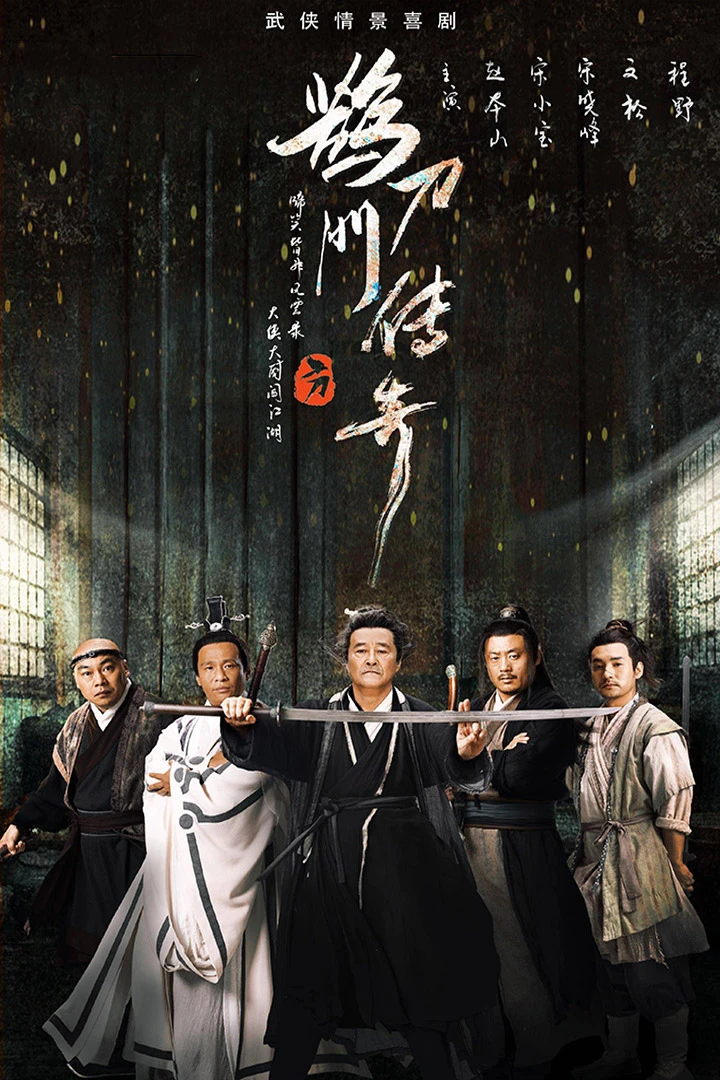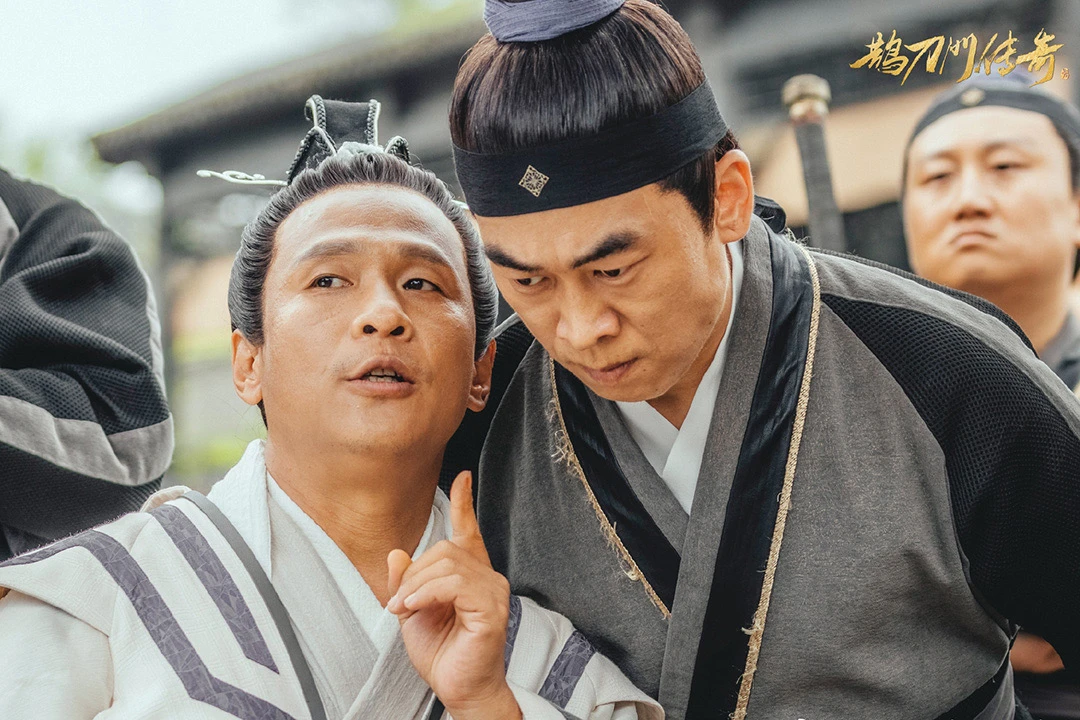“The Legend of Quedaomen” tells an unconventional wuxia story set in a bygone dynasty, where Japanese pirates run rampant, and eunuchs hold power. Cao Gonggong (played by Yang Shulin) of the Eastern Depot conspires with the Japanese pirates to stage a rebellion. Ximen Changhai (played by Zhao Benshan), the leader of the Quedaomen sect, is a key figure in the alliance against the Japanese pirates. To investigate the traitors in the court who are colluding with the pirates, he plans to leave the sect, but worries that his sudden departure might raise suspicions. To solve this problem, Ximen Changhai finds his timid twin brother, a cook named Ximen Changzai (also played by Zhao Benshan), to impersonate him as the sect leader. Thus, a cook becomes a sect leader, and a hilarious “legend” unfolds.
Similar to “My Own Swordsman,” “The Legend of Quedaomen” is a sitcom that deconstructs the “Jianghu” (martial arts world). The core scenes of the story mainly take place in Quedaomen, with a limited shooting space. Each episode revolves around a theme and gradually reveals the face of the “Jianghu” through a series of “gags.” So far, the gags in this drama may not be particularly loud, but they are frequent and thought-provoking.
For example, the first episode presents the social phenomenon of people who owe money and refuse to pay. When someone knocks on the door and shouts, “Ximen Changzai, pay back the money,” Ximen Changzai lies to Ximen Changhai, saying, “I don’t want the money they owe me anymore. I’ve told them many times.” The Changbai Mountain sword competition scene is even more satirical. Ximen Changhai appears at a critical moment during the competition, helping Quedaomen win first place. The third-place prize is 300 taels of silver, and the second-place prize is 300 taels of gold. When the disciples are expecting to receive 1,000 taels of gold, the results are announced: “The winner is Quedaomen, and the prize is the most precious portrait of Cao Gonggong.”
“The Legend of Quedaomen” is also a series filled with modern elements within an ancient narrative framework, with no shortage of absurd jokes. To pursue “Ximen Rou,” Ximen Changhai’s second disciple “Zhao Dezhu” wants to portray himself as a descendant of a famous family. When asked which famous family he belongs to, he blurts out, “Zhao Benshan.” Shaolin Temple introduces a “black box” to raise funds for the restoration of the Sutra Pavilion, corresponding to the current “blind box” trend. Each box contains different martial arts secret manuals. One of the blind boxes reveals the “Acupoint Secret Manual,” but when the box is opened, it turns out to be eye exercises: “First move, press the Jingming acupoint; second move, massage the temples and rub the eye sockets…”
In addition to planting jokes and delivering gags, the comedic value of the series is not inferior to its thoughtfulness in serious dramas. “The Legend of Quedaomen” achieves this: Ximen Changhai and Ximen Changzai do not belong to the same world, but to break Cao Gonggong’s conspiracy of colluding with the Japanese pirates and harming the martial arts world of the Central Plains, they are forced to become the same person.
In the Jianghu, Quedaomen is a righteous sect that does not seek personal gain, so their life is not prosperous, while other sects become wealthy by deceiving people and recruiting disciples. When the second disciple Zhao Dezhu uses public opinion to create gossip news about the leader of the Wudu Sect, unexpectedly, not only does the other party not get angry, but they also actively seek cooperation. The Changbai Mountain sword competition is full of satirical elements. Contestants who do not obey Cao Gonggong are eliminated by him using various “underhanded means.” Gao Damao, played by Song Xiaobao, bribes his way through and ultimately makes it to the finals.
There’s no doubt that many viewers choose to watch “The Legend of Quedaomen” because of Zhao Benshan. In recent years, Zhao Benshan, who has left the Spring Festival Gala stage, has not retired from the comedy scene and has persisted in acting in film and television works. In the 15th season of “Rural Love,” he plays the soul character Wang Danna, but his role is limited. The “Liu Laogen” series, which he has led and continued to update in the past three years, has also failed to fully meet the increasingly high aesthetic demands of the audience. Therefore, many viewers are waiting for Zhao Benshan’s next “masterpiece.”
In “The Legend of Quedaomen,” Zhao Benshan plays two roles: one is Ximen Changhai, the righteous leader of the Quedaomen sect, whose every move exudes the aura of a great hero; the other is the timid Ximen Changzai. In the drama, Zhao Benshan spends most of his time portraying Ximen Changzai. Evidently, he is more suited to interpreting characters who are slightly cunning, humble, stingy, vulgar, or even sleazy. In the drama, every move Zhao Benshan makes is a performance. With just a few glances, the image of an unorthodox old man from a rural area in ancient Northeast China has quietly taken shape.
The creators of “The Legend of Quedaomen” stated that they hope to create a wuxia world with Northeast characteristics: “Our original intention was to create a down-to-earth Northeast version of wuxia, placing these lovable characters from the Northeast region into a familiar wuxia world, and imagining what stories from the martial arts world would unfold in a parallel universe in Northeast China.”
The drama opens by creating a strong Northeast atmosphere, presenting a voiceover in the form of a Northeast-style narration: “Our heroes from various martial arts sects have spontaneously organized an anti-Japanese armed group called Dingyuan Alliance, planning to fight the Japanese pirates to the death. You can’t let people ride on our backs and bully us, right? But the road to resist the Japanese is not easy…” Afterward, the scene cuts to Zhao Benshan, and a standard Northeast dialect hits the audience.
The costume and makeup design also has Northeast characteristics. Although the drama’s time setting is fictional, it takes Northeast China during the Ming Dynasty as a reference for costume and makeup. The creators visited many shooting locations during the preparation stage, but none matched the setting of “Quedaomen” in the drama. Eventually, they decided to use local materials in Northeast China to build rough ancient rural buildings.
During the Ming Dynasty, the clothing styles of Northeast people were unique—both Han and Manchu residents retained their traditional clothing styles while also being influenced by the popular styles of the time. Therefore, the clothing style of “The Legend of Quedaomen” combines a “mixed warrior style” with an “emphasis on the texture of life” to create a light wuxia style. In terms of style, the most basic robes, shirts, and skirts of traditional Chinese hanfu clothing are adopted to convey the simple and honest qualities of rural Northeast China.
How is the wuxia world created? It relies on the production team! The drama’s chief producer, Li Chunyuan, based on his experience as a director of the comedy variety show “Happy Comedian,” led more than 20 young screenwriters to invest in the creation and polishing of the script, developing the story of “Quedaomen.” Director Wu Di, who has followed Tsui Hark in shooting wuxia films since entering the industry and was the champion of the 10th World Wushu Championships, is adept at expressing the wuxia feel. The drama also brings together an outstanding behind-the-scenes team, including the styling director of “Wind Rises in Luoyang,” the art director of “A Chinese Ghost Story,” the executive director of “The Longest Day in Chang’an,” the effects team of “The World,” and the cinematography director of “The Great Hypnotist.” Ultimately, the wuxia style of “The Legend of Quedaomen” is unique, with both the cool side of flashing blades and the amusing side of colorful tricks.



